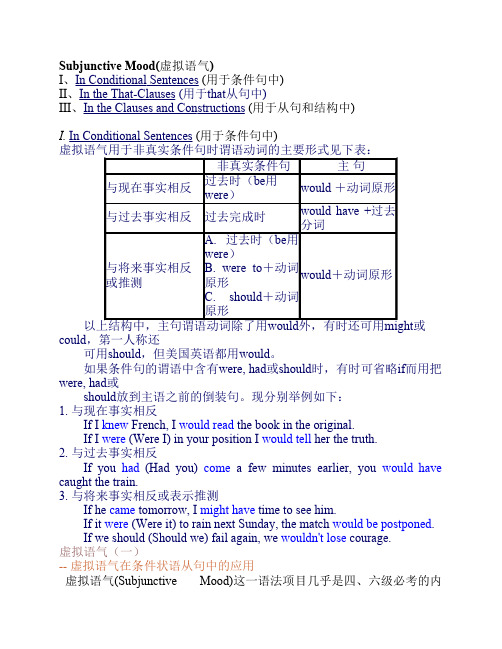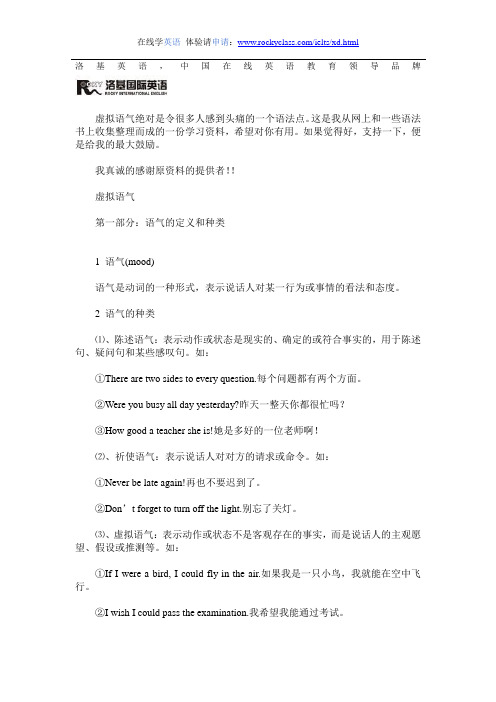大学英语四六级考试虚拟语气详解资料(四)
大学英语六级词汇之虚拟语气

大学英语六级词汇之虚拟语气2015大学英语六级词汇之虚拟语气虚拟语气是一种动词形式,表示说话人的一种愿望、假设、怀疑、猜测、建议等含义,虚拟语气所表示的含义不是客观存在的事实。
虚拟语气可用于多种句式中。
用法1. 用在简单句中虚拟语气用在简单句中,表示祝愿,命令。
如:May you be happy. 祝你幸福。
May you have a good time. 祝愿你玩的痛快。
May the friendship between us last long. 祝愿我们的友情天长地久。
Have a good journey! 祝愿你旅途愉快!2. 用在宾语从句中动词 wish, suggest, order, insist, propose 等词后面的宾语从句表示的是一种虚拟语气,宾语从句中的动词动作表示的只是一种愿望、要求。
动词 demand, suggest, order, insist, propose 后面的从句中,“should” 可以省略。
如;I wish she would be on my side. 我希望她能站在我这一边。
He insisted that all of us should be there on time by any means. 他坚持要我们大家想尽办法按时去那儿。
The teacher suggested that we (should) clean the blackboard after class. 老师建议我们课后把黑板擦了。
He ordered that the students wash the clothes every week by themselves. 他要求学生每周都要自己洗衣服。
3. 用在主语从句中“It is (was)+形容词(或过去分词)+that...”结构中,主语从句的谓语用“should+动词原形”表示虚拟语气;“It is time(about time,high time)that...”结构中,主语从句的谓语用“过去时动词形式或should+动词原形”也表示虚拟语气。
英语四级考试中的虚拟语气

英语四级考试中的虚拟语气英语四级考试中的虚拟语气虚拟语气在宾语从句中的用法是一个常见的考点,我们着重讲一下宾语从句常使用虚拟语气的几类特殊动词,以及这些动词的用法、构成虚拟语气的用法等。
下面是店铺为大家带来的英语四级考试中的虚拟语气,欢迎阅读。
一、何谓虚拟?在英语中,语气(mood)和时态,语态一样,都是谓语动词的一种形式。
表明说话的目的和意图,虚拟语气即表示说话人主观愿望或纯假设情况,动词需用特殊形式。
例如If I were a boy。
其中谓语动词用were,而不是am, shall, was, have等,是因为说话人为女士,而“我是男人”仅是其假设的语气,故用了一个在现实情况中绝不可能用到的were来表达这一虚拟的情况。
通过在I的后面加were这一词,能得知这是虚拟假设出来的情况。
常见的虚拟有两种:1. 表示非真实假设情况:If If I had left sooner, I could have caught the train。
如果早点出发,我就能赶上火车了。
(但我事实上已经错过了,对过去的假设虚拟)He talks so loud as if I were deaf。
他说话声太响,就像我聋了一样。
(但事实我没聋,对现在的假设虚拟)这种情况虚拟时,只需将谓语动词变本身的时态再变过去。
第一句话中的虚拟,本身为过去时,因此再变过去,即过去完成时。
left变为had left, could catch变为could have caught。
第二句话中,as if I am deaf,需要对现在假设,因此变为as if I were a deaf。
(不用I was deaf,避免与真实情况过去式混淆)类似表示非真实情况的`词还有wish希望, suppose假设, would rather宁愿, but for要不是等。
2. 表示建议、命令、要求等主观意愿:He suggested that a petition (should) be drawn up。
虚拟语气四级讲解

Subjunctive Mood(虚拟语气)I 、In Conditional Sentences (用于条件句中)II 、In the That-Clauses (用于that 从句中)III 、In the Clauses and Constructions (用于从句和结构中)I. In Conditional Sentences (用于条件句中)或could ,第一人称还 可用should ,但美国英语都用would 。
如果条件句的谓语中含有were, had 或should 时,有时可省略if 而用把were, had 或 should 放到主语之前的倒装句。
现分别举例如下:1. 与现在事实相反 If I knew French, I would read the book in the original. If I were (Were I) in your position I would tell her the truth.2. 与过去事实相反 If you had (Had you) come a few minutes earlier, you would have caught the train.3. 与将来事实相反或表示推测 If he came tomorrow, I might have time to see him. If it were (Were it) to rain next Sunday, the match would be postponed . If we should (Should we) fail again, we wouldn't lose courage.虚拟语气(一)-- 虚拟语气在条件状语从句中的应用虚拟语气(Subjunctive Mood)这一语法项目几乎是四、六级必考的内容,也是各类英语考试中心测试的重点之一。
虚拟语气是一种特殊的动词形式,用来表示说话人所说的话并不是事实,而是一种假设、愿望、怀疑或推测。
英语四级语法 虚拟语气

虚拟语气一.一般虚拟条件句(1) 与现在事实相反——If I were you, I wouldn’t worry.——If I had the book at hand, I would read the passage to you.那么,虚拟语气现在时的句型为:从句:If + 主语+动词过去式(be 变were) +…主句:主语+would (should ,could ,might ) + 动词原形+…(2) 与过去事实相反——If you had gone to last night’s games, you would have met him.——If the policeman had arrived earlier, he would have seen the accident.那么,虚拟语气过去时的结构是:从句:If+主语+过去完成时…主句:主语+should (或would,could,might) + 现在完成时…(3) 与将来事实相反——If he should come tomorrow, I would give him the dictionary he needs.——If Mr. Li were to do the experiment tomorrow, he might read the instructions carefully.那么虚拟语气将来时的句型是:从句:If+主语+should (或were to )+动词原形+…主句:同虚拟语气现在时的主句结构。
练习:1.I f this report were more accurate, it __________ an invaluable document.A.wereB.had beenC.will beD.would be(D)2.I _______ in trouble if the police had stopped me.A.wereB.would have beenC.would beD.had been(B)3.W hat would you do if war _________ out.A.breaksB.could breakC.had broken outD. were to break(D)二、在if引导的虚拟条件句中,若有were, had, should,可省去if,将were, had, should提到主语前,形成倒装。
英语四级听力的特殊疑问句和虚拟语气

英语四级听力的特殊疑问句和虚拟语气英语四级听力考试是众多大学生备考的重点之一。
在听力考试中,特殊疑问句和虚拟语气是经常出现的考点。
本文将重点讨论这两个语法知识点,并给出一些实用的技巧和例子。
一、特殊疑问句(Special Interrogative Sentences)特殊疑问句用来询问事物的特定信息,通常以特殊疑问词(如what、when、where、who、whom、whose、which、why、how等)开头。
在英语四级听力中,特殊疑问句经常用于获取听力材料中的关键信息。
1. Wh- 开头的特殊疑问句例如:What is the lecture mainly about?这类特殊疑问句通常用来询问主题、内容以及主要信息。
在听力过程中,应特别关注关键词或短语,以确定正确答案。
2. How 开头的特殊疑问句例如:How does the professor define the term "culture"?这类特殊疑问句通常用来询问方式、方法、定义等。
在听力时需注意关键词或短语的解释或例子,以了解其含义或方式。
二、虚拟语气(Subjunctive Mood)虚拟语气用来表达假设、愿望、建议、命令等非现实或假设情况下的语气。
在英语四级听力中,虚拟语气常常用于听力材料中的对话或信息转述。
1. If / Wish 引导的虚拟语气例如:If I were you, I would take the opportunity.这类虚拟语气用来表达假设、愿望或建议。
在听力中,需要注意对话中的虚拟条件句,并根据语境确定正确的答案。
2. Should / Were 引导的虚拟语气例如:He spoke to me as if I were his best friend.这类虚拟语气用来表达假设、推测或类似情况。
在听力中,需要关注上下文信息,以找到暗示或提示答案的线索。
除了上述考点,英语四级听力还会涉及其他语法知识点和表达方式。
非常详细的虚拟语气讲解资料,四六级绝对有用

洛基英语,中国在线英语教育领导品牌虚拟语气绝对是令很多人感到头痛的一个语法点。
这是我从网上和一些语法书上收集整理而成的一份学习资料,希望对你有用。
如果觉得好,支持一下,便是给我的最大鼓励。
我真诚的感谢原资料的提供者!!虚拟语气第一部分:语气的定义和种类1 语气(mood)语气是动词的一种形式,表示说话人对某一行为或事情的看法和态度。
2 语气的种类⑴、陈述语气:表示动作或状态是现实的、确定的或符合事实的,用于陈述句、疑问句和某些感叹句。
如:①There are two sides to every question.每个问题都有两个方面。
②Were you busy all day yesterday?昨天一整天你都很忙吗?③How good a teacher she is!她是多好的一位老师啊!⑵、祈使语气:表示说话人对对方的请求或命令。
如:①Never be late again!再也不要迟到了。
②Don’t forget to turn off the light.别忘了关灯。
⑶、虚拟语气:表示动作或状态不是客观存在的事实,而是说话人的主观愿望、假设或推测等。
如:①If I were a bird, I could fly in the air.如果我是一只小鸟,我就能在空中飞行。
②I wish I could pass the examination.我希望我能通过考试。
③May you succeed!祝您成功!虚拟语气在语法里算得上是个难点。
让我们就从最简单的开始吧。
第二部分:简单句中的虚拟语气一、情态动词的过去式用于现在时态时,表示说话人的谦虚、客气、有礼貌、或委婉的语气,常用于日常会话中。
如:⑴.Would you be kind enough to show me the way to the post office?请你告诉我去邮局的路好吗?⑵.It would be better for you not to stay up too late.你最好别熬夜到很晚。
最新 四六级常考语法精讲:虚拟语气-精品
四六级常考语法精讲:虚拟语气四六级常考语法之虚拟语气1. 表示现在/过去/将来情况的虚拟条件句虚拟条件句主要有三种结构:1) 表示与现在情况相反:主句谓语用“would / could / might +动词原形”,从句谓语用“动词的一般过去时”(动词be的过去式一律用were)。
If I were you, I would not accept his offer.If I had time, I would certainly go to the cinema with you.2) 表示与过去情况相反:主句谓语用“would / could / might + have +过去分词”,从句谓语用过去完成时。
If I had got up a little earlier, I wouldn’t have missed the train.If I had been more careful, I might have passed that exam.3) 表示与将来情况相反:主句谓语用“would / could / might +动词原形”,从句谓语用“were +动词不定式”或“should +动词原形”。
If I were to do the job, I would not be able to have enough time to study.If it should rain tomorrow, I would not go out with you.2. 虚拟条件句连接词if的省略如果虚拟条件句的从句中含有were, had, should, could等词时,可以省略连接词if,但这时必须把were, had, should, could等词移到主语前面,形成倒装。
这种句型主要用于书面形式。
Were I to do the job, I would finish doing it within two weeks.Had it not been for his help, we couldn’t have arrived there on time.Should it rain tomorrow, I would stay at home.3. wish后宾语从句中的谓语构成动词wish后的宾语从句表示未实现的或不可能实现的愿望,其宾语从句中的谓语动词要用虚拟语气,有以下三种构成形式。
四级语法真题解析虚拟语气解析
四级语法真题解析虚拟语气解析四级语法真题解析——虚拟语气解析在四级英语考试中,语法是一个重要的考点,而虚拟语气作为其中的一部分,往往会引起考生的困扰。
本篇文章将从真题解析的角度,重点讲解四级考试中常见的虚拟语气用法和解题技巧。
1. 引导条件状语从句的虚拟语气在各类真题中,虚拟语气通常用于条件句中。
在条件句中,如果假设的条件与事实相反或者不可能实现,就要使用虚拟语气来表达。
例如,2019年6月份四级阅读真题中的一道题目是:"If you had learned to play a musical instrument as a child, you _____ playing one now."A. might have enjoyedB. might enjoyC. must have enjoyedD. would enjoy这道题目考察的就是过去的虚拟语气。
根据题意可知,主句中使用的是过去完成时态,在此基础上,我们需要使用与过去相反的虚拟语气形式。
因此,在条件从句中使用过去完成时态的虚拟语气,答案选项为A,即"If you had learned to play a musical instrument as a child, you might have enjoyed playing one now."2. 引导宾语从句的虚拟语气在四级考试中,虚拟语气有时也会用于宾语从句中。
特别是在一些形容情感、命令、建议等动词后面的宾语从句中,常见虚拟语气的运用。
例如,2019年12月份四级阅读真题中的一道题目是:"He recommended that the patient _____."A. sees a specialistB. will see a specialistC. saw a specialistD. see a specialist根据题目可知,主句中使用了虚拟语气动词"recommended",因此在宾语从句中需要使用虚拟语气形式。
英语六级语法讲解:虚拟语气
英语六级语法讲解:虚拟语气英语六级语法讲解:虚拟语气以下是小编带来的英语六级语法讲解:虚拟语气,欢迎阅读。
虚拟语气的考点可以归纳如下:1. (should)+动词原形的情形(已考)2. if或but for等引导的条件句(已考)3. wish, if only, it is time…的用法(should)+动词原形的情形1.在动词suggest, order, demand, propose, command, request, desire, insist, require, decide, promise, resolve, argue, maintain, determine, recommend, advise, advocate, persuade等表示“命令”、“建议”、“要求”动词后的.宾语从句中。
She insisted that the seats (should) be booked in advance. 她坚持要预定座位。
He advised that the doctor (should) be sent for. 他劝我们派人请医生。
注:如果上述动词作其他意思解释,或者说话者认为所讲的事是事实,要用陈述语气。
When asked why he declined our invitation, he suggested that he was not on good terms with the director.真题重现【CET-4:2006.6】The professor required that __________________(我们交研究报告)。
参考答案:we hand in our research report(s)2.在advice, demand, order, necessity, resolution, decision, proposal, requirement, suggestion, idea, recommendation, request, plan,等名词后的主语从句或表语从句中------上面动词对应的名词He issued the order that the troops (should) withdraw atonce. 他命令部队马上撤退。
英语四级高级语法讲解:虚拟语气
英语四级高级语法讲解:虚拟语气虚拟语气是说话者用来表示假设,或难以实现的情况,而非客观存在的事实,所陈述的是一个条件,不一定是事实,甚至完全与事实相反。
下面是作者整理的英语四级高级语法讲解:虚拟语气,欢迎大家阅读学习。
引导的虚拟语气2.倒装形式Were I you(=if I were you),I would get up early in the morning.Had you arrived at the station ten minutes earlier yesterday(=If you had arrived…),you could have caught the train.Should it rain(=If it should rain),the crops would be saved.It is time that ...Would rather that.....(1)I would rather he came tomorrow than today.(2)John would rather that she had not gone to the party yesterday evening.(3)I would rather everything hadn t happened in the past.“It is(was)+形容词(或过去分词)+that……”结构中的虚拟语气is necessary that we(should 可省略,下同)have a walk now.was necessary that we(should) make everything ready ahead of time.is required that nobody(should) smoke here.is important that every pupil(should) be able to understand the rule of school.练习’ll be busy this he ___ free,he ___ to the cinema with you.to be; might go going to be; will gobe; might have gone ; will goEdison died,it was proposed that the American people _____ all power in their homes,streets,and factories for several minutes in honor of this great man.off offturn off turned offI known her name,_____.does she know mine? where does she live?would have invited her to lunch would be beautiful’d rather you ______ by train,because I cant bear the idea of your being in an airplane in such bad weather.go gogonevictim ________(本来会有机会活下来) if he had been taken to hospital in time.would have a chance to survive(翻译)professor required that ________(我们交研究报告)。
- 1、下载文档前请自行甄别文档内容的完整性,平台不提供额外的编辑、内容补充、找答案等附加服务。
- 2、"仅部分预览"的文档,不可在线预览部分如存在完整性等问题,可反馈申请退款(可完整预览的文档不适用该条件!)。
- 3、如文档侵犯您的权益,请联系客服反馈,我们会尽快为您处理(人工客服工作时间:9:00-18:30)。
最牛英语口语培训模式:躺在家里练口语,全程外教一对一,三个月畅谈无阻!洛基英语,免费体验全部在线一对一课程:/ielts/xd.html(报名网址)条件句中的虚拟语气第一节:if引导的条件句中的虚拟语气虚拟语气表示一种不能实现的假设。
该语法主要用于if条件状语从句。
一、if引导的条件状语从句的分类及虚拟条件句的判断1、可以把条件句分为两类:1).真实条件句(Sentences of Real Condition):凡是假设的情况发生性可能很大,就是真实条件句。
例如:⑴、If I have time , I will help you with this work.如果我有时间会帮助你做此工作的。
⑵、As long as I say anything wrong, you must point it out.只要我说了什么错话,你一定要指出来。
⑶、If time permits, we'll go fishing together.(如果有时间的话,我们就一起去钓鱼。
)2).虚拟条件句(Sentences of Unreal Condition):当假设是不大可能实现时,就是虚拟条件句。
例如:⑴、If I were you , I would have attended the meeting. 如果我是你的话,就去参加会议了。
⑵、If he had come here yesterday, he would have seen his old friend.假如他昨天来这儿的话,就会看见他的老朋友。
⑴、If it had rained yesterday, we would have stayed at home.(如果昨天下雨的话,我们就会留在家里。
)2、.if条件状语从句中虚拟语气的判断判断是真实条件句还是非真实条件句。
只有在非真实条件句中才使用虚拟语气。
通过句子意思,看假设的条件是否能够实现,能够实现是真实条件句,不能使用虚拟语气;假设的条件不能实现则是非真实条件句,要用虚拟语气。
判断这个假设是与哪个事实相反。
通常有三种情况:①与过去事实相反。
②与现在事实相反。
③与将来事实可能相反。
3、“后退一步法”后退一步法是指在准确地判断了该句与哪一事实相反后,按虚拟语气的后退一步法处理从句谓语动词的时态。
即:在非真实条件状语从句中,谓语动词按正常情况“后退一步”。
也就是:①与过去事实相反,在从句中用过去完成时形式表示。
②与现在事实相反,在从句中用过去一般时形式表示。
③与将来事实可能相反,在从句中用过去将来时形式表示。
主句中则用情态动词would, should, could 等加一个与从句一致的动词形式。
例:⑴、If I had come her yesterday, I would have seen him.⑵、If I were a teacher, I would be strict with my students.⑶、If it should snow tomorrow, they couldn't go out.4、注意事项①if条件句中如有were, should, had,可以省去if,并使用倒装语序。
②在现代英语中if条件状与从句中的谓语动词如果是be其过去形式一般用were。
二、虚拟语气在if 引导的条件句中的用法:(一)、表示与现在事实相反的情况。
其句子结构为:从句:if + 主语+ 动词的过去式(be 用were) + ……主句:主语+ would (should, could , might) + 动词原形+ ……例:1.If I were you, I would go with him.2.If the weather were fine, I would go there.如果天气好,我去那儿。
(事实天气不好)3.If I were you, I would read it again.如果我是你的话,我再读一遍。
(事实上我不是你)4.If time permitted, I would write it again.如果时间允许的话,我再写一遍。
(事实上时间不允许)5.If it weren’t snowing, we wouldn’t stay in the house.要是现在不下雪的话,我们就不会待在屋里。
(事实上现在下雪)6.What would I do if I were in your place?要是我处于你地位我会怎么办?(事实上我不在你的位置上)7.If he hurried, he could catch the first bus.他要是快点能够赶上头班公共汽车。
(可是他不着急)8.If it weren’t for your help, we would get into trouble.如果没有你们的帮助,我们就会陷入困境。
(而事实上得到了你们的帮助)9.If we had the manpower, we could open up even more land.如果有人力,我们还能开更多的荒地.10. If I were you, I would go with him.(从句If I were you, 主句I would go with him.)11. If I were you, I should buy it.(从句用过去式动词were,主句用动词原形buy)12. If I had time, I would study French.(如果有时间,我会学习法文。
)(从句用过去式动词had,主句用动词原形study)13. If she knew English, she would not ask me for help.(如果她懂英文,她就不必要我帮了。
)(从句用过去式动词knew, 主句用动词原形ask)注意:如果动作在进行中,主句要用:"主语+ would be + 进行式动词+ ……"14. If they were here, he would be speaking to them now.(从句用过去式动词were, 主句用would be speaking)(二)、表示与过去事实相反的虚拟条件句。
其句子结构为:从句:If + 主语+ had +过去完成式动词+ ……主句:主语+ would (should, could, might) + have +过去完成式动词+……例如:⑴、If you had taken my advice, you would not have made such a mistake.如果你听了我的劝告,就不会犯这样的错误。
(事实上你没有听我的劝告)⑵、I shouldn’t have been able to write such good novels if I hadn’t lived among the peasants for five years.如果我不是和农民生活了五年,就不可能写出这样好的小说。
(事实上我和农民生活了五年)⑶、If you hadn’t invited me, I shouldn’t have come to the party.如果你不邀请我,我就不会来参加你的舞会。
(事实上你邀请了我)⑷、If it hadn’t been for your help, I shouldn’t have finished this work on time. 要是没有你们的帮忙,我就不会按时完成了这项工作。
(事实上你们帮助了我)⑸、If he hadn’t broken the law, he wouldn’t have been put in prison.如果他不违法的话,就不会被打入监狱。
(事实上他违法了)⑹、If I hadn’t been ill yesterday, I might have come to school.昨天要是不生病,我是可能来上学的。
(事实上我生病了)⑺、If I had been your headmaster, I should have dismissed you from school. 我要是你们校长的话,就把你开除学籍了。
(事实上我不是)⑻、If you had studied harder last term, you could have passed exam.(从句动词用had studied, 主句动词用have passed)如果你在上个学期用功一些,你就会在考试中过关了。
⑼、If you had taken my advice, you wouldn't have failed in the exam.(从句动词用had taken, 主句动词用have failed)如果你当时听从我的劝告的话,你就不会在考试中失败了。
⑽、If you had got up earlier, you could have caught the train.(从句动词用had got up, 主句动词用have caught)如果你起身得早一点,你就会赶得上火车了。
⑾、If it had snowed, I would have skied in the park.(从句动词用had snowed, 主句动词用have skied)如果下雪的话,我就可在公园里滑雪了。
注意:如果动作在进行中,主句要用:"主语+ would + have + 完成进行式动词+……⑿、If they had been here, he would have been speaking to them.(从句动词用had been, 主句动词用have been speaking)(三)、表示与将来事实相反的虚拟条件句(对将来的事实实现的可能性不大)。
其句子结构为:从句:If + 主语+ should (或were) + 动词原形+……主句:主语+ would (could, should, might) + 动词原形+……例如:⑴、If I were to work at this problem, I would do it in another way.要是我来解这道难题,我会用另外一种方法的。
⑵、If you were to do such a thing again, you would be punished. 如果你再做这样的事情,就会受到惩罚。
⑶、If I should work harder, I could make much more progress.假如我更努力学习的话,我会取得更大的进步。
